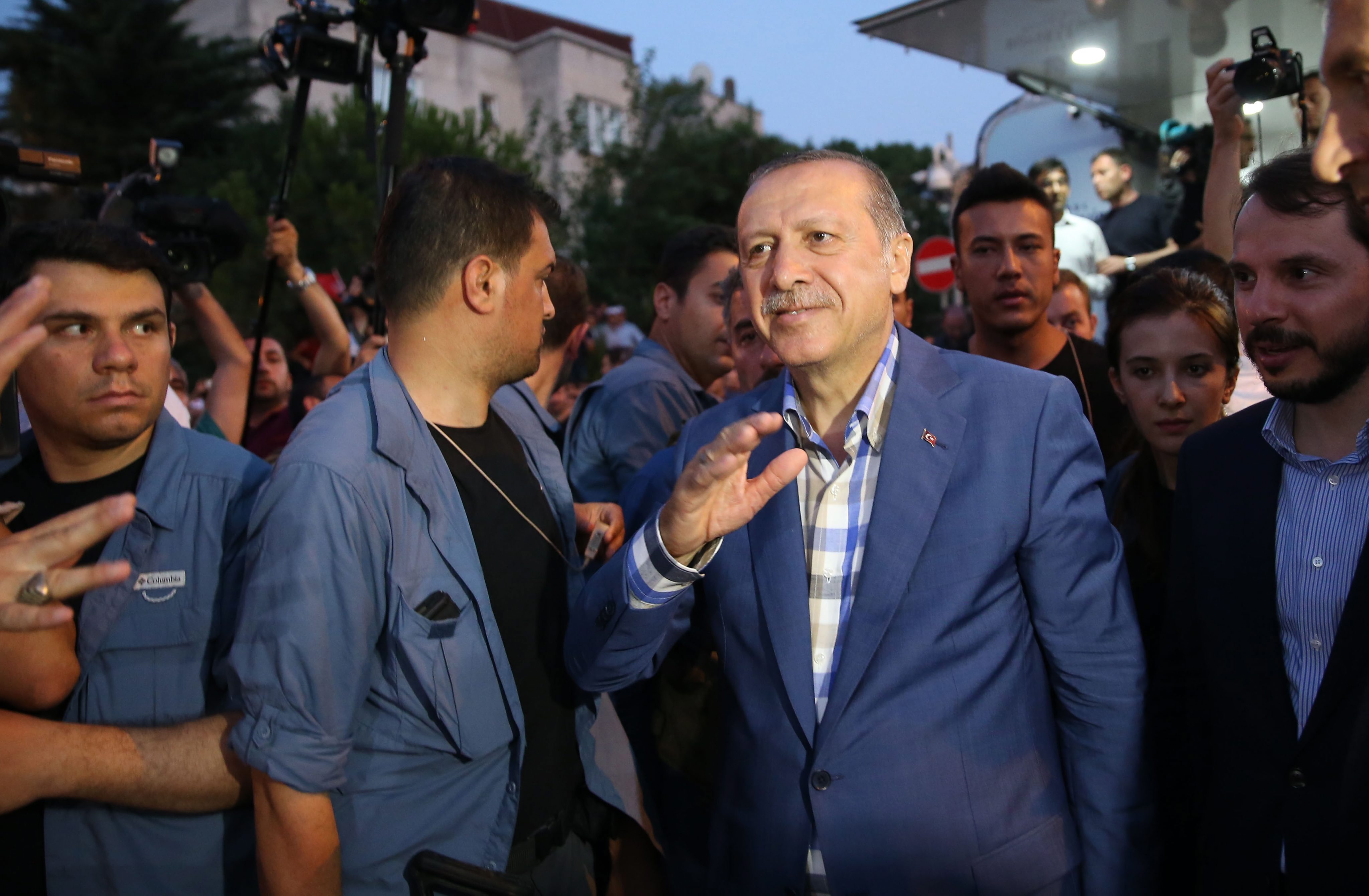The ease with which Turkish President Recep Tayyip Erdogan countered Friday’s attempted coup and rounded up suspects on Saturday shows the strength of his grasp on the political reins of his country.
But the coup’s aftermath, which has already involved a purge of the ranks of Turkey’s military and judiciary and a possible spat with the United States, Turkey’s NATO ally, is likely to leave the country less unified and weaker economically and diplomatically, analysts say.
Erdogan “comes out strong in the sense that he can purge a lot of enemies,” said Joshua Landis, who heads the Center for Middle East Studies at the University of Oklahoma. “But ultimately Turkey is very weakened. Economically, it’s going to hammer Turkey. Diplomatically, people are going to treat it with kit gloves. Mostly, foreign investment is going to flee.”
Surrounded by thousands of supporters upon his arrival in Istanbul on Saturday while fighting continued around the city, Erdogan sounded triumphant. He pledged that coup plotters would “pay a heavy price.”
And he gave credit to supporters who heeded his call, made by iPhone FaceTime to a Turkish broadcaster the night before, to flood the streets and block the coup in its tracks.
“This government, brought to power by the people, is in charge,” he said.
Next, Turkey’s prime minister announced the detention of 2,839 military officers suspected of involvement in the coup attempt, and the dismissal of 2,745 judges he said are working for a self-exiled cleric, Fethullah Gulen, who Erdogan has long accused of plotting to overthrow him.
Gulen lives in Pennsylvania, and Turkish officials have said they will submit an extradition request to the United States next week, according to the Associated Press. Secretary of State John Kerry told Turkey to submit "any legitimate evidence that withstands scrutiny."
Erdogan is often portrayed in the West and by his critics at home as an authoritarian Islamist ruler seeking to increase his hold on power while provoking controversy with powerful regional players like Russia and Israel. But he also enjoys immense popularity in Turkey, in large part because he turned around the country’s economy and presided over its greatest boom times in modern history.
He also pioneered a moderate form of political Islam that focused on economic results, and helped unify the country and end a long-running insurgency with Kurdish separatists in the east.
Erdogan’s career began as the first Islamist mayor of Istanbul, Turkey’s largest city. His term ended in 1998, when he was sentenced to prison for inciting religious hatred with a speech that compared the faithful to an army and the minarets of their mosques to bayonets.
As prime minister, Erdogan aligned Turkey’s economy with the European Union and presided over a 272% increase in the country’s economic output. Much of that was achieved by lowering inflation, shrinking sovereign debt and increasing exports by 325% from 2002 to 2012, according to The Economist.
As president, he has sought to improve economic relations with Europe while railing at Western immorality when it comes to supporting the popular uprising that sparked the Syrian civil war to Turkey’s south. The war has displaced millions of Syrians, including 2.7 million who have registered in Turkey, according to the United Nations.
But he also clashed with political opponents. In May, he forced out then-Prime Minister Ahmet Davutoglu who'd resisted Erdogan's bid to change the Turkish constitution to invest more power in the presidency. In March, Turkish authorities shuttered the country's largest circulation newspaper, Today's Zaman, which Erdogan accused of acting on behalf of Gulen, who he accused even then of plotting a coup. The closing came after a series of arrests of journalists on terrorism charges, which the free speech group Index on Censorship labeled efforts to silence critics.
John Herbst, a former U.S. ambassador and director of the Eurasia Center at the Atlantic Council think tank in Washington, said Erdogan’s handling of the crisis was a result of his strong following, and an image honed on state-controlled media.
“Last night I thought he was on the ropes, but in fact it was over very quickly,” Herbst said. “The fact he was able to do that shows he has a lot of strength.”
Landis predicted a fallout with long-term repercussions as Turkey tries to figure out “who was behind this coup.”
“This is going to further fragment Turkish society,” which is already under strain from the Syrian civil war to the south and a series of attacks blamed on Kurdish separatists and the Islamic State terror group, Landis said.
“And he’s picking a fight with America over this Gulen thing,” Landis said.
“Turkey was a shining example of a successful Middle Eastern country, and now it’s like every other Middle Eastern country — living with factionalism and fragile,” Landis said.
As an example, Landis pointed to his own university in Norman, Okla., where he was supposed to lead a class of 20 students to Turkey to establish a study center. But that plan has now been canceled.
“And that’s just a little university in the middle of America,” Landis said. “Think what all the big businesses are going to do.”

![EPA TURKEY COUP ATTEMPT WAR COUP D'ETAT TUR [image : 87198460]](http://www.gannett-cdn.com/media/2016/07/16/USATODAY/USATODAY/636042920031724212-EPA-TURKEY-COUP-ATTEMPT.jpg)

